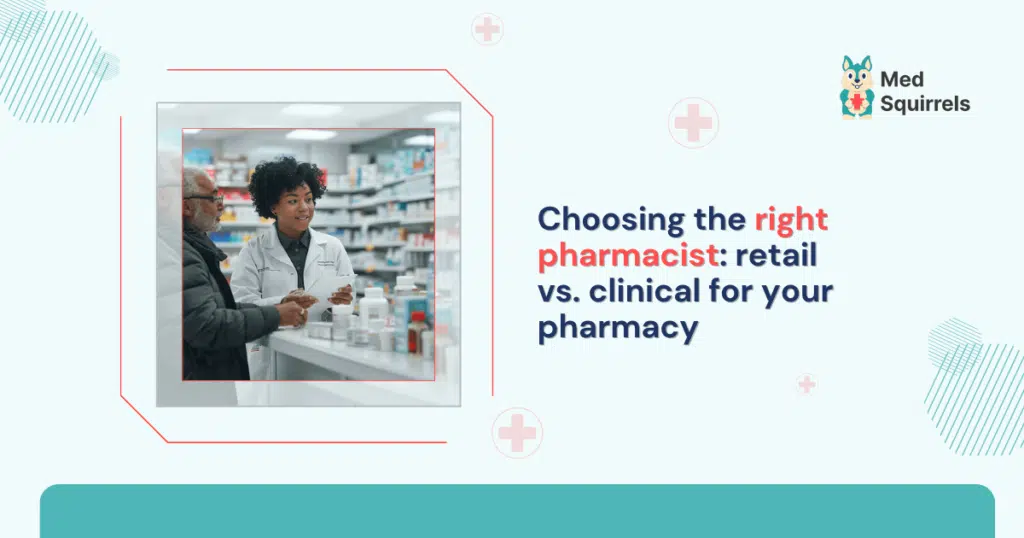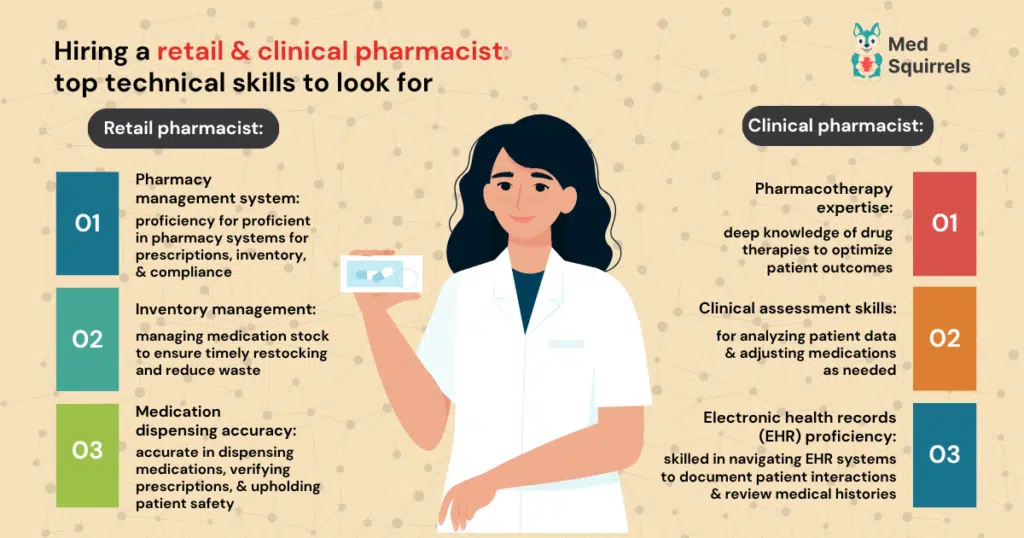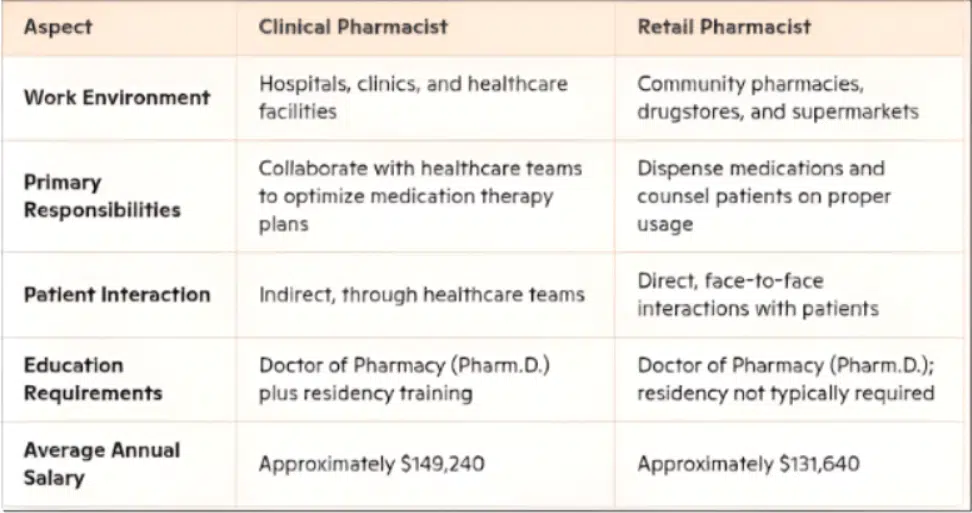Choosing the right pharmacist: retail vs. clinical for your pharmacy

With over 300,000 licensed pharmacists in the U.S., healthcare systems must carefully assess whether to hire a clinical pharmacist vs a retail pharmacist based on setting, care goals, and patient needs. As demand for specialized expertise grows in both environments, making the right choice ensures that the correct skill set is applied, improving safety, compliance, and patient outcomes.
Leveraging modern healthcare staffing solutions can streamline this decision, helping facilities recruit pharmacists who are role-ready and compliant. This blog guides healthcare providers in making informed hiring decisions using evidence-based strategies and top healthcare staffing platforms.

Understanding retail and clinical pharmacist roles
To hire the right pharmacist, you first need to understand the key differences in the clinical pharmacist vs retail pharmacist dynamic. Retail pharmacists primarily assist customers by filling prescriptions and providing advice. Clinical pharmacists, meanwhile, serve as key members of healthcare teams and work to manage and adjust treatments.
Retail pharmacist:
- Dispense medication and provide basic counseling.
- Frequently work in chain stores, grocery pharmacies, or neighborhood pharmacies.
Clinical pharmacist:
- Oversee medication therapy and assist with treatment regimens.
- They usually work in healthcare settings like hospitals, clinics, or long-term care facilities.
To help clarify the differences, the table below outlines a direct comparison between clinical and retail pharmacist roles across several key aspects.
Key differences between clinical and pharmacist roles

source: U.S. Bureau of Labor Statistics
Recruiting considerations for retail versus clinical pharmacists
Selecting between retail and clinical pharmacists involves a good grasp of job demands and applicant qualifications. As pharmacist shortages throughout the nation exist, hiring becomes more competitive.
Skills to search for:
- Retail pharmacists: Customer service skills, attention to detail, and regulatory compliance.
- Clinical pharmacists: Clinical decision-making, communication, patient-centered care.
Work environments:
- Retail: Retail pharmacists work in a busy, fast-paced environment where they interact with many customers.
- Clinical: Clinical pharmacists work in a team-oriented setting, focusing on using data to improve patient care.
Pharmacists’ profile evaluation checklist and retention tips
Recruitment for facilities requires specific strategies to source the correct professionals. Whether recruiting for a hospital or retail chain, a well-defined job description and intelligent sourcing tools are the keys. Ensure to tailor your job advertisements to specify clinical pharmacist vs retail pharmacist specifications. Moreover, you can utilize networks such as pharmacist associations and employer boards via innovative healthcare staffing techniques.
Candidate evaluation checklist:
- Technical skills and licenses
- Regulatory understanding
- Cultural and team fit
Retention tips:
- Provide training, mentorship, and career opportunities.
- Emphasize perks such as flexible schedules and career advancement, especially relevant when mapping PharmD career options for long-term planning.
MedSquirrels: a pharmacy staffing solution to tackle the growing challenges of pharmacist recruiting
Despite this clarity, many facilities struggle with pharmacist hiring challenges. Outdated processes and generic recruiting methods often lead to:
- Poor fit between pharmacist skills and work environment
- Delays from incomplete or slow credentialing
- Administrative overload on internal teams
- Increased turnover due to role mismatches
These issues do not just impact staffing—they directly affect care quality, workflow efficiency, and patient safety. That is why healthcare leaders increasingly seek specialized pharmacy staffing solutions designed for today’s complex environments.
This is where MedSquirrels makes a difference. Our healthcare staffing platform is built to streamline pharmacist hiring with a focus on precision, compliance, and long-term fit. Whether you’re filling a clinical hospital role or retail pharmacy position, MedSquirrels helps you hire pharmacists who are not just qualified, but role-ready. We eliminate agency markups and simplify credentialing, payroll, and onboarding so you can focus on patient care, not paperwork.
To meet diverse staffing needs, MedSquirrels offers three cost-efficient plans:
The Orange Plan offers an end-to-end solution for facilities looking to both source and manage contract pharmacists. Our team finds and screens candidates, schedules interviews, and supports you through hiring, onboarding, and HR management—ideal for growing teams or facilities with limited internal HR support.
Our Purple Plan supports facilities that have already sourced their pharmacists. We handle everything from credentialing and onboarding to payroll, benefits, and full regulatory compliance, ensuring your team stays focused on care while we take care of operations.
Last but not least, the Blue Plan is designed for those seeking long-term, full-time placements. MedSquirrels sources and screens candidates across all PharmD career options, helping healthcare leaders build stable, high-performing pharmacy teams.
Each MedSquirrels plan is built around transparency, technology, and compliance. Whether you’re staffing for a clinical pharmacist vs retail pharmacist role, we help match the right professional to your care environment. With our modern healthcare staffing platform, you reduce time-to-hire, ensure credentialing accuracy, and improve long-term workforce stability.
Do you have further questions about how our platform works? Schedule a FREE demo, and we will show you the capabilities of our hiring platform.
FAQs
How does the pharmacist’s work environment differ in retail and clinical settings?
Retail pharmacists typically operate in fast-paced, customer-facing roles, while clinical pharmacists work in collaborative, medically focused pharmacist work environments where they provide direct patient care and support
What education is required for both clinical and retail pharmacists?
Both clinical and retail pharmacists must earn a Doctor of Pharmacy (PharmD) degree; however, PharmD career options in clinical settings often demand additional credentials, such as completing a residency or obtaining board certification.
How can employers decide between hiring a clinical vs retail pharmacist?
Employers should evaluate the pharmacist’s work environment, the specific patient population, and the facility’s care goals before deciding whether a clinical pharmacist vs retail pharmacist is the best fit for the role.
How quickly can we staff a pharmacist using MedSquirrels?
Healthcare facilities can significantly reduce time-to-hire with MedSquirrels’ pre-vetted pool of candidates and tech-driven workflows for both clinical pharmacist vs retail pharmacist roles.
Can MedSquirrels support facilities in rural or underserved areas?
Yes, our extensive national network allows us to support healthcare facilities, including those in remote areas, in finding qualified professionals for even the most difficult-to-fill hospital pharmacy roles.
Jani Basha is a healthcare content expert at MedSquirrels, sharing insights on staffing trends, hiring best practices, and career growth.
